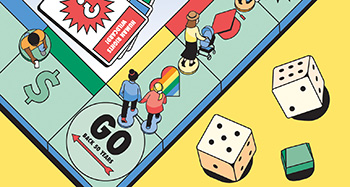By Deron Snyder
The high court issued three rulings in June 2023 — on affirmative action, same-sex couples and student loan cancellation — that have the potential to disproportionately harm minority and disadvantaged groups. The impact on social workers and clients will be substantial.
”The Supreme Court’s impact on our lives has always been very significant,” says Rebekah Gewirtz, MPA, executive director of NASW’s Massachusetts and Rhode Island chapters. “These rulings are a step backward for social work, social justice and all the things we’ve been fighting for.”
Some see a common effect stemming from the court’s Roe ruling last summer and its three decisions this summer.
“They create increased demand for social services because more and more people are going to be disadvantaged, hurt and deprived,” says Mimi Abramovitz, DSW, MSW, professor emerita at Hunter College, CUNY and the CUNY Graduate Center. “The pressure (on social workers) is going to increase because Congress is more interested in defunding programs that deliver benefits. So you have a perfect storm of increased pressure.”
The U.S. Supreme Court rulings undid decades of legal precedents and are affecting how social workers practice. The profession is challenged to help ease the pressure on individuals and families stemming from these decisions, which can create ethical challenges for social workers.
“All of these rulings are critical for us to talk about as a field,” says Duane Breijak, LMSW-Macro, executive director of NASW’s Michigan Chapter. “They impact who we see entering our social work programs as well as who can stay in our profession. Social work is the largest mental health field in the country.”
Read the full feature article in the NASW Social Work Advocates magazine.




